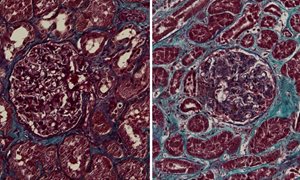17 December 2019
The Kolff grants recipients are:
Patients undergoing kidney transplantation are treated with immunosuppressive medication mainly aimed at suppression of the adaptive immune system. These drugs are effective but come at the cost of substantial adverse side effects, such as infections, cancer, and diabetes. In his research he focuses on the development of a new type of treatment aimed at the innate immune system with the aim of preventing acute rejection. For this purpose he will use nanotechnology to deliver medication very specifically to monocytes and macrophages. This has the advantage of efficient delivery of drugs specifically to these cells, while the total amount of medication that enters the body can be minimized, reducing potential side effects.
Nephrotic syndrome (NS) is characterized by massive proteinuria, hypoalbuminemia and edema, as a result of extensive podocyte foot process effacement. The mainstay of therapy for NS patients is prednisone. NS management is as yet unpredictable, mainly because the molecular mechanisms underlying NS and prednisone treatment are poorly understood. Moreover, prednisone treatment is associated with severe adverse effects. Hence, there is an urgent need to develop more specific therapies to treat NS with less side effects. The aim of her study is to resolve molecular targets regulated by prednisone that are essential for successful podocyte recovery. These results will be instrumental for the development of more specific therapeutic entities to treat NS with less side effects.

The Kolff grants recipients are:
- Raphaël Duivenvoorden, theme Renal disorders
Patients undergoing kidney transplantation are treated with immunosuppressive medication mainly aimed at suppression of the adaptive immune system. These drugs are effective but come at the cost of substantial adverse side effects, such as infections, cancer, and diabetes. In his research he focuses on the development of a new type of treatment aimed at the innate immune system with the aim of preventing acute rejection. For this purpose he will use nanotechnology to deliver medication very specifically to monocytes and macrophages. This has the advantage of efficient delivery of drugs specifically to these cells, while the total amount of medication that enters the body can be minimized, reducing potential side effects.
- Jitske Jansen, theme Renal disorders
Nephrotic syndrome (NS) is characterized by massive proteinuria, hypoalbuminemia and edema, as a result of extensive podocyte foot process effacement. The mainstay of therapy for NS patients is prednisone. NS management is as yet unpredictable, mainly because the molecular mechanisms underlying NS and prednisone treatment are poorly understood. Moreover, prednisone treatment is associated with severe adverse effects. Hence, there is an urgent need to develop more specific therapies to treat NS with less side effects. The aim of her study is to resolve molecular targets regulated by prednisone that are essential for successful podocyte recovery. These results will be instrumental for the development of more specific therapeutic entities to treat NS with less side effects.
Related news items

Academic collaboration agreement between UTwente and Radboudumc
23 November 2021 The group of Biomaterials Science and Technology (BST) of the Faculty of Science and Technology at the TechMed centre of University of Twente has signed a formal academic collaboration agreement with the departments of Nephrology and Physiology at Radboudumc. go to page
Molecular scissors play a role in kidney and lung leakage in COVID-19 patients
18 June 2020 ‘Molecular scissors', play a role in leakage of fluid from blood vessels to lungs and kidneys in COVID-19 patients. The scissors cut the protective sugar layer in the blood vessels. The more serious the disease, the more active the scissors, wrote Johan van der Vlag and colleagues in MedRxiv. go to page.aspx?width=2120&height=1414&ext=.jpg&type=BlockColumn1Zoom1)
New insight into the effect of hydroxychloroquine undermines its use in corona
11 June 2020 Researchers at Radboud university medical center have discovered an as yet unknown effect of hydroxychloroquine. Raphael Duivenvoorden was interviewed in the program Op1 at NPO1 to elaborate on the findings. It seems unlikely that chloroquine has beneficial effect in corona infections. go to page
Johan van der Vlag appointed as professor of Immunology of Kidney Diseases and Transplantation
23 April 2020 Johan van der Vlag is an expert in unravelling the molecular and immunological mechanisms underlying kidney disease and transplantation. His research stems from clinical questions and focuses on the development of new diagnostic/prognostic and therapeutic strategies. go to page
